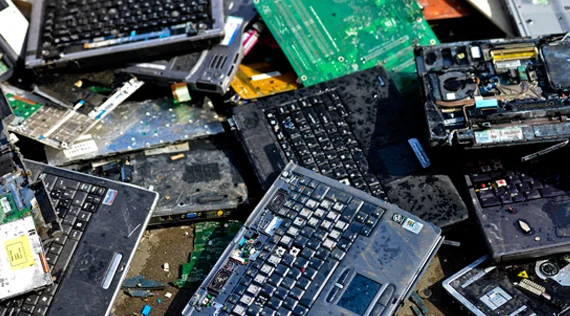According to the SCB EIC survey, opinions and needs of Thai consumers in promoting the green electronics industry have been collected.
SEATTLE (Scrap Monster): The rapid evolution of technology has significantly accelerated the turnover of IT devices, leading to their quicker transition into electronic waste (E-waste) compared to other product categories. This technological advancement has drastically shortened the life cycle of electronic products. According to The Global E-waste Monitor, global e-waste amounted to 62 million tons in 2022 and is projected to rise to 82 million tons by 2030, reflecting an average annual increase of approximately 2.6 million tons.
Thailand is also grappling with the issue of overflowing e-waste in its cities. According to the Pollution Control Department’s environmental quality report, the volume of e-waste in Thailand has risen by approximately 17% annually over the past decade, reaching 439,495 tons in 2022. This surge is partly attributed to evolving consumer behavior, particularly in the IT sector, where rapid technological advancements drive frequent product turnover. Supporting this, the SCB EIC survey on “Sustainable Consumption” reveals that IT devices like smartphones and tablets are among the fastest contributors to e-waste, with around 30% of Thai consumers replacing their devices every 1-5 years.
Consumers are becoming more aware of the E-waste problem, but still lack knowledge on waste separation.
Currently, Thai consumers are becoming more interested in environmental issues and E-waste, but some still have problems in managing E-waste appropriately. Consumers around the world are increasingly aware of the importance of environmental issues and E-waste, as reflected in the Euroconsumers survey data, which indicates that more than 90% of respondents in EU countries are aware that E-waste is not general waste, with almost half aware of their participation in E-waste recycling.
A significant challenge lies in effective management, as less than half of the respondents are able to properly separate E-waste. In Thailand, the SCB EIC survey revealed that over 88% of respondents are concerned about environmental issues and the rising volume of E-waste, with 30% reporting that they have taken E-waste to a designated collection point. However, some consumers still face difficulties in handling E-waste, with approximately 20% continuing to act as E-waste accumulators, as they rarely or very rarely dispose of electronic products.
Thai consumers show growing interest in eco-friendly electronics despite budget limitations
The E-waste problem has caused Thai consumers to place more importance on green electronic products in line with global trends, but there are still budget constraints if the products are more expensive than general products. The pollution problem and the increasing amount of E-waste have caused consumers to place more importance on green products, while entrepreneurs have also turned to develop more green products. This is reflected in data from Future Market Insights, which indicates that the global market value of green electronic production is expected to increase from US$17.3 billion in 2023 to US$17.7 billion in 2033, with an average growth rate of 26.14% per year (between 2023 and 2033).
Meanwhile, the demand for green electronic products in Thailand is expected to grow in line with global trends. According to a survey by SCB EIC, most Thai consumers are interested in green electronic products and are willing to pay more. However, more than half of consumers are willing to pay more, but not more than 5%. At the same time, some consumers are still not interested in green electronic products due to budget constraints and view green electronic products as more expensive than general products. In addition, about 1 in 3 consumers surveyed are beginning to view environmental issues as an important factor in choosing products, such as energy saving. Environmental certification, etc.
ESG pressures accelerate development of green electronics
ESG pressures accelerate the development of green products in the electronics industry. The consumer behavior survey results show that ESG pressures are a major challenge for entrepreneurs in the electronics supply chain, who must adjust their strategies and develop their production towards green electronics to meet the needs of green consumers. The changing business strategies of major players will have a cascading impact on suppliers in the manufacturing supply chain, who must also adapt to ensure that their products or materials fed into the manufacturing process are certified by their partner companies. Currently, many countries around the world are increasingly aware of the E-waste problem, especially in the European Union (EU), which requires entrepreneurs who produce electronic products for sale in the EU to produce products in accordance with the EU’s standards. For Thailand, the Ministry of Industry is currently proposing a draft of the Industrial Waste and Electronic Waste Act. If the law passes the parliamentary process and is enforced, it will be an important turning point for Thailand, leading to a more serious, effective, and tangible management of electronic waste.
Thailand should urgently address the E-waste problem while promoting the use of more green products.
However, the management of E-waste and the development of green electronic products in Thailand still have many challenges, which the government measures will play an important role in pushing forward. Although the government is in the process of proposing laws on E-waste, in terms of implementation, there are still many challenges because E-waste management still requires cooperation from both the public and private sectors, as well as resources in terms of capital and personnel. At present, it is found that the allocation of areas or E-waste collection points in communities is still insufficient. In addition, although Thai consumers are starting to become more aware of the E-waste problem, they still lack knowledge on how to dispose of or separate E-waste from general waste. In addition, law enforcement may not be strict enough, which results in the E-waste problem still being an endless threat to Thailand.
According to the SCB EIC survey, opinions and needs of Thai consumers in promoting the green electronics industry have been collected. The policy recommendations are as follows:
1) Promote the establishment of “take-back” or “purchase” points for e-waste.
2) Establish “drop-off” points for segregated e-waste.
3) Promote a project to subsidize the purchase of green electronic products.
4) Tax privileges for the business sector from purchasing green electronic products, such as energy-saving or recyclable office equipment.
5) A project to provide knowledge about waste management and information on green electronic products.
6) Issue serious regulations on e-waste management.
7) Promote/attract investment in the green electronic product supply chain, including legislation to control and increase taxes for groups that are not green electronic products. 8) Provide soft loans for investment projects in the green electronic industry.
Courtesy: www.thailand-business-news.com





 Member
Member